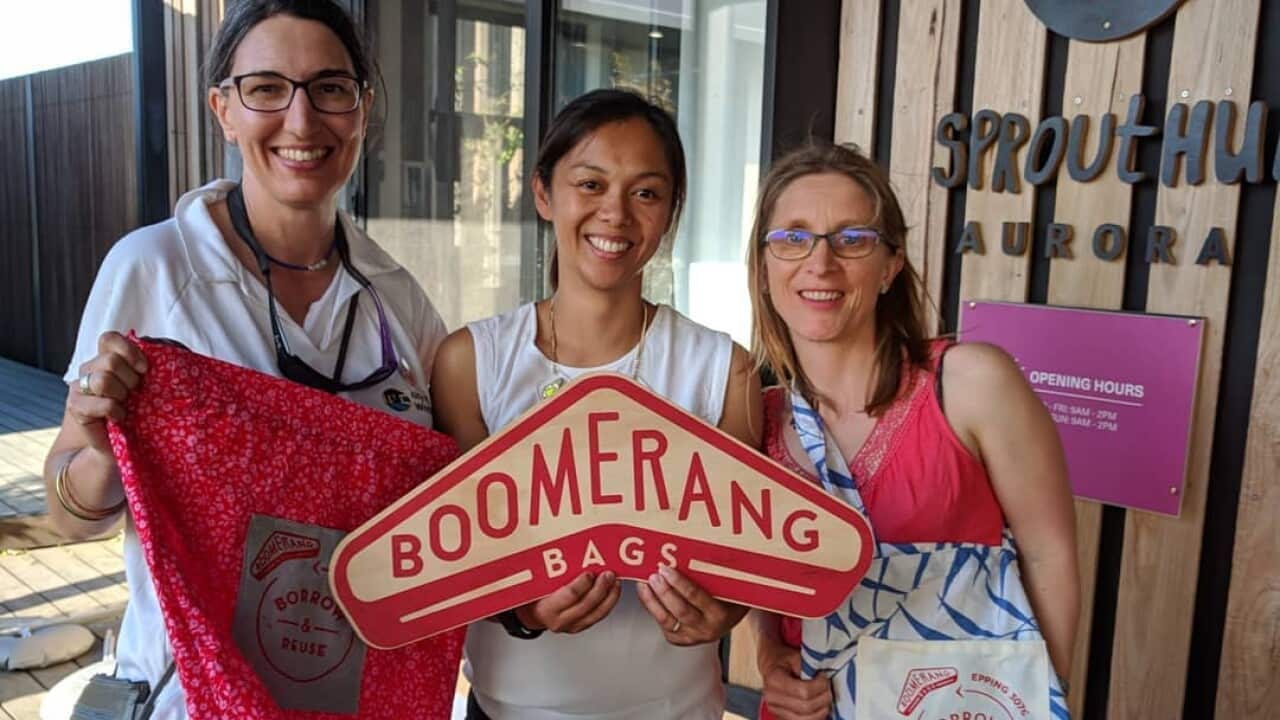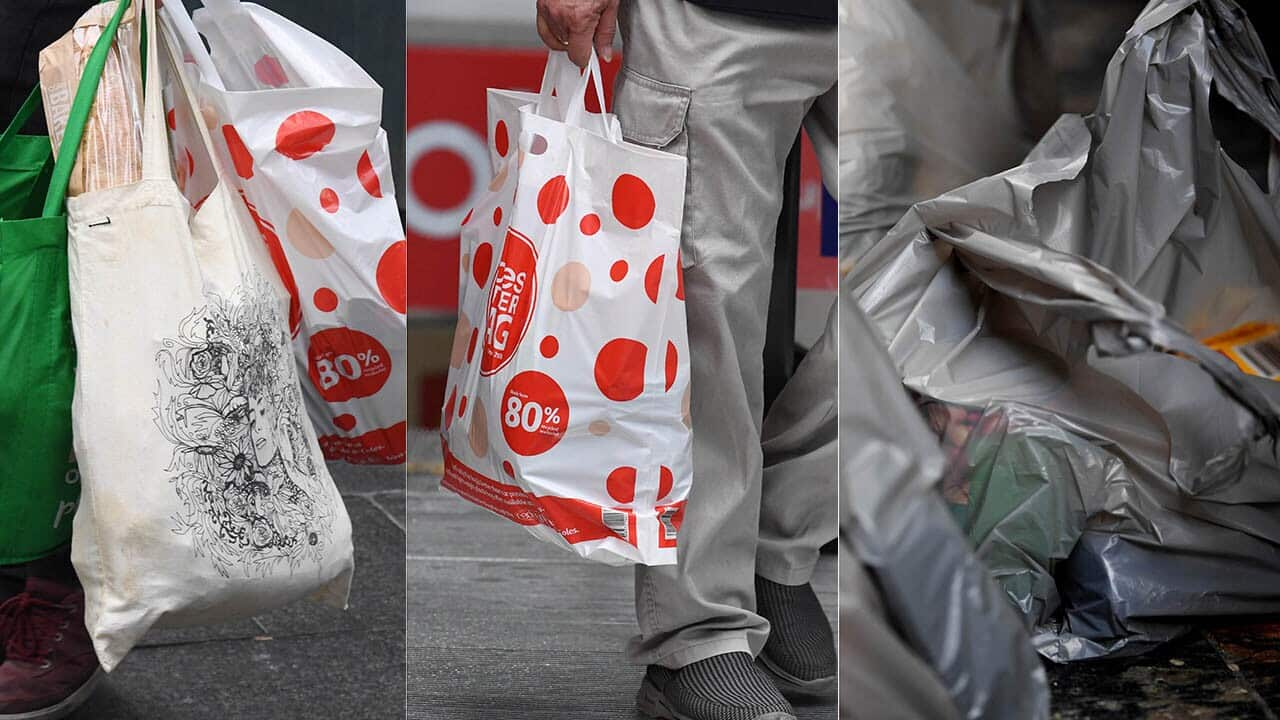In a sea of queueing groaning shoppers, mum-of-two and nurse Marjorie Garcia happily welcomes the ban on single-use plastic bags. While others complain about the inconvenience of not having free plastic bags at their disposal, Ms Garcia instead collaborates with other members of her community to create a better, more sustainable solution.
Ms Garcia is one of the more vocal leaders of the Boomerang Bag community in Victoria.
Boomerang Bags, reusable bags made from scraps of old linen and fabric, were conceptualised and first sewn by a small community in Queensland. Alarmed by the apparent plastic pollution on the coast, the group decided to hand out these upcycled bags to shoppers to prevent them from using single-use plastic bags. After usage, people would then return the borrowed bags so that other people could use them; hence the term, ‘boomerang’. Boomerang Bags have now made their way into different communities, including Epping in Victoria where Ms Garcia resides.
Boomerang Bags have now made their way into different communities, including Epping in Victoria where Ms Garcia resides.

Boomerang Bags are reusable bags made from scraps of linen and fabric. Source: Marjorie Garcia
Although the Epping community gives its bags away for free, receivers usually reciprocate the goodwill by donating fabric or money to maintain the machines that volunteers use to sew the bags.
“People are suspicious when you just give them free bags,” Ms Garcia says. “You have to explain the concept. It’s about building a community as well. It’s [about starting] conversations. It’s raising awareness in that way.”
And raising awareness she did – first and most importantly, within her family.
Like most people in Australia, recycling was already commonplace in the Garcia household even before the family decided to live a more sustainable lifestyle. The practice helped them to adjust more easily to the changes, but she admits that it takes time and patience to fully integrate new habits into an already-established routine.
Adopting new habits, like bringing reusable bags to the shop, can be inconvenient; but Ms Garcia believes that it is necessary to ensure that she leaves “the world in a better shape” for her daughters Maddie and Zara.
She jokes that while she would probably go overboard living an eco-driven lifestyle, her husband JR balances her out by helping her be more practical with her ideals. After all, for a life of sustainability to be sustainable, it has to be practical.
For Ms Garcia, here are some of the more practical and doable habits you can adopt in order to live a more sustainable life:
1. Use paper or biodegradable plastic for organic waste. Ms Garcia suggests that you re-evaluate the way you dispose waste.
Ms Garcia suggests that you re-evaluate the way you dispose waste.

Line your bin with paper and use paper to wrap organic waste. Source: Marjorie Garcia
"You find a lot of the stuff that's yucky is mostly organic waste," she shares.
Instead of using single-use plastic to line your bin or scoop up your pet's feces, she suggests wrapping organic waste in paper or biodegradable plastic. Remember to wash your bins at least once a week.
2. Walk or take public transport. Walking and taking public transport instead of using a car lessen carbon emissions.
Walking and taking public transport instead of using a car lessen carbon emissions.

Walk or take public transport instead of driving. Source: Marjorie Garcia
Sharing that they are fortunate to live close to shops and to their daughters' school, Ms Garcia says that they try to avoid driving as much as possible. However, she does admit, "If we're running late, of course I am human...[like] this morning, we had to put the kids in the car because we were running so late."
3. Choose reusable over single-use.

When ordering coffee, JR has a reusable cup on hand to avoid using single-use cups. Source: Marjorie Garcia
Single-use materials and goods produce more waste. So instead of using single-use goods such as straws, cups, and bags, opt for their reusable counterparts.
4. Try not to buy over-packaged goods.

While living totally plastic-free can be difficult, try to opt for less packaging when buying produce. Source: Marjorie Garcia
Ms Garcia shares that Plastic Free July prompted her to live a more plastic-free life. She says that the annual event made her realise how much plastic we actually use and how much we depend on them. And while she admits that she isn't living plastic-free yet, she is more conscious about her plastic usage.
When she shops for groceries now, she opts to buy loose fruits and vegetables instead of prepackaged produce. She suggests that for those who don't have access to a bulk store that sells loose produce, it is better to purchase goods that are sold in glass, paper or steel aluminium. She notes that while plastic can be recycled, the quality of the reprocessed material is significantly inferior compared to virgin plastic.
5. Involve your family.
Change starts in the home, and as Ms Garcia shares, "Every little bit makes a difference. If eight billion people said no to plastic straws, that’s eight billion straws that don’t end up in landfills."
Ms Garcia credits her family for helping her sustain her sustainable lifestyle. Not only have the Garcias taken on new habits, Maddie and Zara have become "little ambassadors" who help spread the word about Boomerang Bags. They also enjoy eco-friendly activities such as helping tend to a vegetable garden and “getting their hands dirty [with a worm farm]" in their backyard. Shifting to a more sustainable life can be difficult. It can be annoying. It can be frustrating. For some, it can even be downright excruciating. But it really isn't the end of the world. It might even be the start of a better one.
Shifting to a more sustainable life can be difficult. It can be annoying. It can be frustrating. For some, it can even be downright excruciating. But it really isn't the end of the world. It might even be the start of a better one.

"Little ambassadors" Maddie and Zara with their grandparents Source: Marjorie Garcia
ALSO READ

